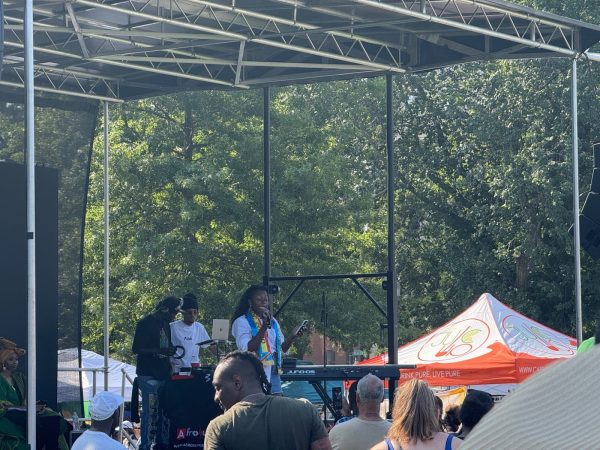The damp, trimmed lawns of Boston Common became a space for percussionists, musicians, strong singers, and a multinational showcase of African cultures on Aug. 16. Their audience grew with more passersby who danced to the rhythms, drank fruity beverages, and browsed for vendor finds.Â
The African Festival of Boston, in its 15th year, once again hosted a celebration of its communities. The festival entertained attendees with a range of familiar and unfamiliar artifacts and traditions from across Africa and its diaspora. While robes waited for patrons on carts, the smell of rich, African cuisine permeated Boston’s central park. Festival vendors sold hand crafts, spiced stews, bright, geometric-patterned attire, and other items from the Caribbean Islands to Madagascar.Â
The two-day festival held performances from several African musical groups. Acts included improvised drum and dance, choreographed routines, and aerobic fitness from Sylver Rochelin, a Malagasy dance-fitness instructor, and founder of Froca Fitness. Rochelin led an intense fusion of African and Caribbean moves for a large crowd of festival goers.
The lineup also included theater actress Phylicia Pearl Mpasi from “The Color Purple (2023),” and her mood-lifting speech that emphasized the unification of the African nations with the rest of the world.

Founded in 2010 by Mireille Tushiminina and her mother, and cultivated through her non-profit organization, Shalupe Community Alliance, the festival was created to build connections between nearby African communities and members of the diaspora, especially for the African refugees supported by her foundation.Â
“We wanted to create a platform where African immigrants will have access to services, access to other communities, build a community, but more importantly, share our culture,” Tushiminina said to the Baystate Banner in 2024.
​​The event not only serves as a meeting ground for African communities, but also highlights African business owners in Massachusetts. African and immigrant-owned businesses currently grapple with neighborhood gentrification and immigration hurdles. However, inclusion and harmony are what Tushiminina hopes to facilitate for her attendees.
“I think the African culture has space for everybody,” she said to the Banner, “and I hope people can take a little bit of that sunshine that I love so dearly with them.”